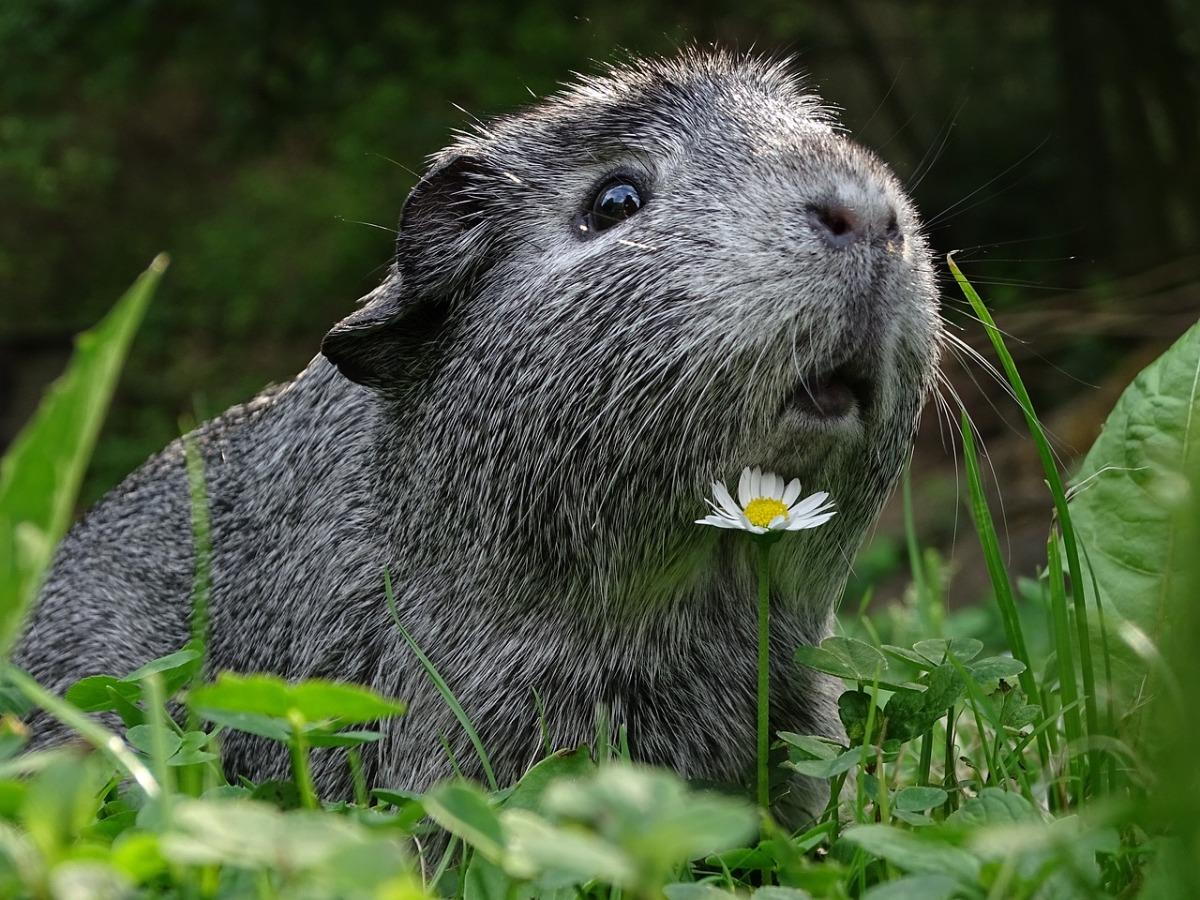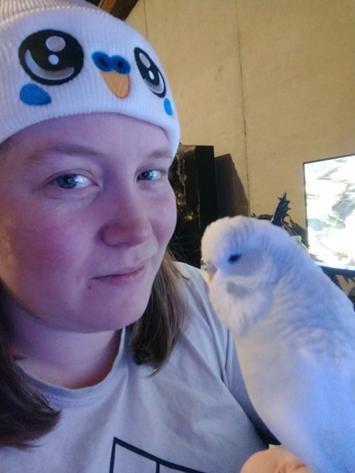
- posted: Apr. 05, 2024
Caring Animal Hospital Spring Newsletter
Guinea Pigs as Pets
Did you know that March was “Adopt a Guinea Pig” month? Guinea pigs (cavies) are a very popular pet Michigan and the rest of the United States. Unfortunately, most people adopt guinea pigs from pet stores or other sources that are not trained to offer appropriate husbandry information to adopters. The aim of this article is to highlight some information you should know if you decide to welcome a little cavy into your home!
Should I Adopt a Guinea Pig? Consider the commitment- guinea pigs can easily live 5-6 years of age. Some can live up to 10 years of age. They have complex nutritional requirements that when not provided, can predispose them to several diseases such as scurvy (vitamin C deficiency), dental disease, bladder stones, and arthritis. Guinea pigs are incredibly social creatures that come in a variety of different fur colors and patterns. Guinea pigs should be adopted and kept in pairs at a minimum to decrease loneliness and stress. Guinea pigs require daily care. Cleaning their cage daily will help to keep their respiratory tract healthy. Providing a new enrichment item can help curb boredom and keep their curious minds active. Guinea pigs also require daily social interaction. This should include grooming, providing fresh food and water, out of cage time, and if the weather permits, outdoor time.
What should I feed my guinea pig? Grass hays such as timothy, orchard grass, or Oat hay should always be available to your guinea pig. Hay should make up about 70-80% of their diet. Avoid alfalfa hays in adult guinea pigs because it can lead to obesity and the formation of bladder stones. Guinea pigs should also be offered about 1/8 cup of an adult guinea pig pellets per day. Pellets should be free of any added “treats” to avoid selective eating and to make sure they consume a balanced diet. Adults should be offered approximately 1 cup of green leafy vegetables daily. Romaine lettuce, red or green leaf lettuce are examples. Vegetables such as bell peppers can be offered to help provide vitamin C. Fruits and treats should be limited and only given a few times a week. Guinea pigs, like humans, cannot make their own vitamin C. They must get it from their diet. An adult guinea pig should get at least 25mg of vitamin C daily. This can be from their pellets, vegetables, and supplements. I recommend the use of vitamin C tablets over water additives as some guinea pigs will refuse their water if mixed with the supplement.
What about veterinary care? Just like our canine and feline patients, we recommend yearly evaluations in younger guinea pigs. Senior guinea pigs over the age of 5, should have an evaluation every 6 months as they tend to develop diseases faster during their advanced age. These visits will give us a chance to discuss any abnormalities noticed on exams and allow us to take action at the first sign of disease. Diagnostics can be performed at these visits to help establish a baseline for your patient and to screen for common abnormalities (dental disease, arthritis, heart disease, and others). You can also use these visits as a chance to make sure the care you are providing for your pet is appropriate.
If you are looking for a veterinarian for your cavy friend or if you have any questions or concerns regarding your guinea pig, please contact the clinic. Dr. Cotter and Dr. Gruenwald are happy to help! If you are looking to adopt a guinea pig, consider checking out the Cozy Cavy Guinea Pig Rescue. – Dr. Samantha Gruenwald
************
Allergy season is upon us!
To sum up allergies in pets, they can be allergic to 3 things: food, fleas, and/or the environment. A pet can be afflicted by a combination or even all three of these allergies.
Fleas: It is recommended that pets be on year-round preventatives. Even cats that don’t go outside, because you, other people, and other animals can bring them in the house. Giving prevention throughout the winter is also advised, because fleas don’t go away when it gets cold. They come inside where it is warm. You may or may not see fleas or flea dirt on your pet. Cats especially are fantastic at keeping themselves groomed and clean. In addition, animals who do have flea allergies are allergic to the flea’s saliva. It can take as little as 1 bite every 2 weeks to have a skin flare up. This type of allergy often appears as black specks found within the fur, live fleas on the pet, hair loss/itching/redness associated with the rump or tail base and around the neck.
Food allergies: I call this “ears and rears”. When a pet is allergic to a food, it is likely allergic to the protein in that food. NOT THE GRAINS. When a pet is born it is born with a sensitivity to proteins, not just a particular one. So, any protein the pet is exposed to during development can then lead to intolerance. When a protein is consumed in these pets, it is recognized by the immune system as a foreign invader and attacked, resulting in an allergic reaction. These take time to develop. No pet is just born being allergic to chicken or beef. Usually, the pet is on the food for months/years before the immune system can’t tolerate it and initiates a reaction. This can appear as loud gut sounds, flatulence, vomiting, diarrhea, anal gland issue, licking rectum, itching/licking the ears, face, or paws. Owners will notice there is no seasonal predilection. There is no accurate test that can be performed for food allergies. They require a diet trial. The diet needs to be a prescription novel protein or hydrolyzed diet. A novel protein is an “uncommon” protein you pet is unlikely to have had contact with before, i.e. emu, ostrich, alligator, etc. A hydrolyzed protein is a common protein, such as chicken or egg, that has been broken down into its base amino acid components. So small in fact that the body doesn’t recognize it to mount an immune response. Over the counter products are often unrewarding as food companies manufacture and store their foods in the same structures, thereby contaminating a salmon-based diet, with the chicken protein you are trying to avoid. Diet trials on a prescription food require 90 days on that diet, with nothing else by mouth other than that diet except water. No treats, chews, or even flavored pills/monthly prevention.
Environmental allergies: In veterinary medicine, we call this atopy. Atopy is an inherited allergic reaction to allergens (pollen, grass, mold, etc.) that are absorbed across the skin. They usually have a seasonal predilection, and these allergens often can be miles away and still cause symptoms in our pets. Affected dogs also have certain areas of the body where the skin is defective and doesn't form a good barrier. These two combined can cause affected dogs to be intensely itchy and uncomfortable as well as making their skin more susceptible to bacterial and yeast infections. This is characterized by ear infections, stomach rashes, paw licking, hot spots, hives. They don’t routinely get the same symptoms as people involving runny/itching eyes and a stuffy nose. This is diagnosed by performing a skin or blood test. Treatment involves maintaining a healthy skin barrier with medicated baths or wipes, adding supplements to the diet like essential fatty acids, reducing exposure once we know what your pet is allergic to, preventing the itching/scratching/licking with medications, immunotherapy to desensitize your pet to the things in the environment they are reacting to, and treating the secondary infections when they arise.
Please reach out to us if you believe your pet is afflicted with the above symptoms. -Dr. Hailee Cotter
**********************
Employee Spotlight:
Emily Schulz (she/her):
Emily, better known as Emmi, is our new Inventory Manager. She comes to us with 5 years of animal retail inventory experience and is very excited to expand her knowledge to veterinary medicine. She loves all animals and has had many types of animals growing up: from chickens and horses, to dogs, cats, and birds. She currently lives in DeWitt with her husband and 2 budgies. In her spare time, she likes to ride her horse, spend time with friends, and play games. The part of this job that has surprised her the most is how friendly her coworkers are.

Hours of Operation
Occasionally closed Tuesdays or Thursdays from 2pm-3pm for staff training!
9:00 AM - 6:00 pm
9:00 AM - 8:00 pm
9:00 AM - 6:00 pm
9:00 AM - 8:00 pm
9:00 AM - 6:00 pm
Closed
Closed


